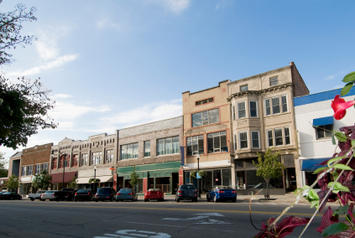
Like many on Main Street Paul Goodpaster is angry. Paul is my banker friend in Morehead, a retail, medical and education hub on the edge of eastern Kentucky. He observed that his bank was doing quite well – albeit hurt now by rising unemployment and an economy starting to have an impact even on those unglamorous places that had minded their business well.
“If only some of those ’experts‘ would get out of their inside-the-beltway heads and visit with me here in Morehead, I’d give them ideas on how this October disaster could have been averted. "Too big to fail,” he scoffed. “It should be about too big to have been allowed to do business and thus too big not to fail!”
So, what can forgotten middle America do about all this mess? Anger won’t get it; and self pity is a waste of time. Only by developing the “swagger” of elbowing our way through the noise can we hope to be heard. We still hear the cacophony of all the blither and blather coming out of the well-connected east coast crowd. Cutting through means learning how we in the “flyover“ zone can position ourselves in the national and global economy.
The world most assuredly did change – likely in perceptible ways prior to but with an exclamation point in October. In November “we” – with more than a few exceptions in the south and middle country – elected a president that exemplified our hopes and dreams. He was touted as a guy who understands cities and community life better than any in modern history.
But, all that being said, middle and certainly southern and Appalachian America did not vote for the president. We are a long way – in our economy, our habits and our viewpoints – from Chicago. We are the home of coal and factories and small places far out of the way.
Our outlook, on the surface, could not be worse. As a community we are out of power and also perhaps out of favor. Yet the world changed for us as well and opportunity abounds for those who are willing and able to fight back. We discovered that (1) we are interdependent with the global community no matter where we are; (2) that the experts don’t all graduate from Harvard and Yale – note the Greenspan bewilderment in October, 2008 and (3) that a new kind of sensibility is emerging.
As the world grows bewilderingly out of control, people will be seeking places that are affordable and welcome growth. That is where middle America comes in.
We will have something close to another 100 to 120 million more people in this country by the year 2050. Conventional wisdom would have it that they will all move to glamorous, hip and fast places. But not so fast on that theory. A visit to Owensboro, Kentucky yields a different answer. Set on the Ohio River across from Evansville, Indiana, Owensboro is a town with a unique DNA that has been preserved over the years. With high performing schools and a rich tradition of civic activism, they are planning a major “quality of life” initiative that the Mayor Ron Payne describes as something aimed squarely at children and grandchildren – a statement that bucks the “all about me era.” Owensboro, with a diverse economy that never rode the wave of the “bubble” always minded its Ps and Qs. He is building walking and bike trails and bolstering a downtown that he describes as the living room to the community.
Owensboro is also home to a world class performing arts center headed up by Zev Buffman, a master producer of over 40 Broadway plays, who made Owensboro his home after visiting the arts center and appreciating its high quality. Zev has convinced Broadway of the wisdom of “staging” plays in Owensboro at a fraction of New York City prices. What is the advantage to Owensboro? Young people can see first hand that life in middle America is not the same as being banished to the boonies. It can also be enriching and connected. As one young man put it: “I can get started earlier in owning a business in a place like Owensboro that would take years or never happen in one of the mega cities where I would just be a cog in the machinery.”
In middle America, we need to learn that nothing is predictable. But we should have more confidence that we can build expertise at home. People like Mayor Ron Payne and Zev Buffman have taken their entrepreneurial spirit and applied it to an emerging new frontier of America’s battered small- to mid-sized cities in the middle of the country. It’s time for this portion of America to stop getting mad, and start getting ahead.
Sylvia L. Lovely is the Executive Director/CEO of the Kentucky League of Cities and the founder and president of the NewCities Institute. She currently serves as chair of the Morehead State University Board of Regents. Please send your comments to slovely@klc.org and visit her blog at sylvia.newcities.org.












